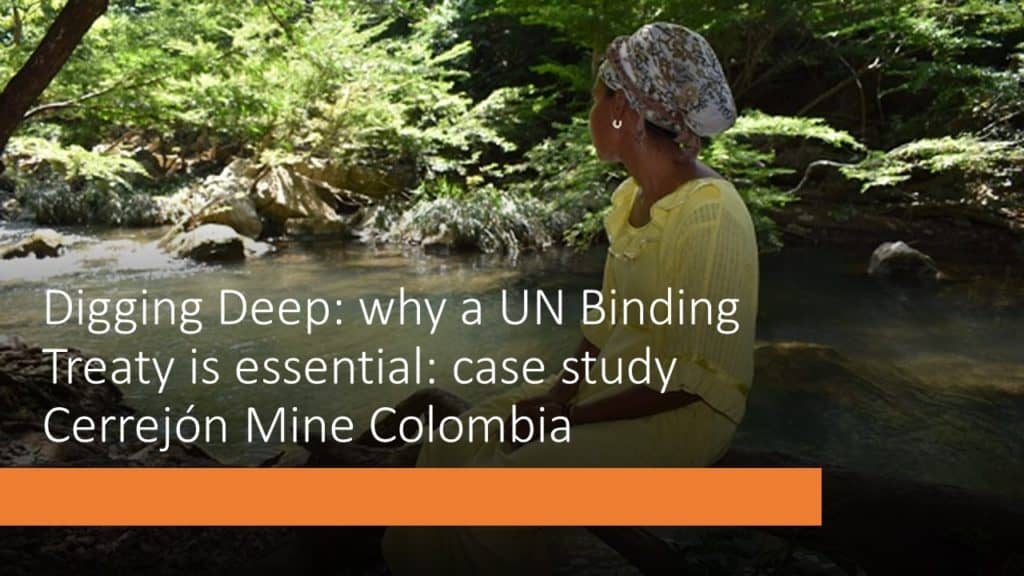Virtual Side Event: To mark the 6th Session of the open-ended intergovernmental working group on transnational corporations and other business practices with respect to human rights

Background
The theme of this event is the ongoing struggle to hold transnational corporations and other business enterprises to account for human rights abuses, environmental harm and corporate misconduct they cause, contribute to or are directly linked to in the global south.
Land and environmental defenders are currently the first lines of defence in the protection of ecosystems and global common goods that are the basis for life on Earth. As the UN Special Rapporteurs on human rights have reported, corporations have often been complicit or directly involved in grave violations against the environment and abuses against those who seek to defend it.
Human rights defenders working on business-related abuses and environmental issues relating to extractive industries, agribusiness, infrastructure, hydroelectric dams and logging often face extreme risks and brutal consequences, such as killings, attacks, sexual violence, smear campaigns, criminalisation, judicial harassment and repression.
The Carbones del Cerrejon Ltd. mine, operating in Guaijra, Colombia is one of the world’s largest open-pit mines. It is jointly owned by subsidiaries of multinational mining companies BHP, Anglo American and Glencore. More than ten court rulings and resolutions from Colombian courts, the Environmental Ministry and other authorities [1] have highlighted the negative impacts of the operation to indigenous and afro-Colombian communities’ right to health, water, to a healthy environment, to participation, to food security, and to live in decent conditions.
However, to date, there has been the inadequate implementation of these court resolutions by Colombian authorities and human rights groups have complained of a lack of full compliance by the company with these rulings and agreements with communities affected or forcefully re-settled. UN human rights expert recently called for a halt to mining close to affected communities in Provincial. The pandemic has also highlighted how, in this semi-arid region, lack of water, exacerbated by mining operations and the
climate emergency, is an important challenge. Human rights and environmental defenders in Guajira denouncing human rights violations or environmental damages or taking public or legal actions have faced great risk and violence, including serious threats, intimidation and attacks.
The case study of Cerrejón illustrates the struggle of communities to defend their human, environmental and spiritual rights and lack of effective redress and justice. It shows the insufficiency of voluntary mechanisms and the huge importance of binding corporate regulation of transnational corporations to stop to corporate-related abuses, and ensure access to justice and international legal redress.
Speakers at this event will make the case for all member states to contribute to a strong UN treaty that will plug the accountability gap, enable access to justice for affected communities, greater protection of environmental and human rights defenders and an end to corporate impunity. Building on calls made by communities and faith leaders globally, and the recent commitment by the European Union to a legislative initiative on due diligence throughout the supply chain on human rights and environmental impacts, there is growing momentum and need for a global human rights-based economy/regime for all companies worldwide, and for states to constructively engage, in progressing towards an international legally binding instrument.
Endnotes:
[1] The Colombian high courts have issued rulings such as T-614/19, SU 698/17, T 704/16, T -256/15, SU – 658/15, among others, which indicate that there is a violation of the rights of the communities, and damage to the environment, water and health by the extraction activity of the company, the Ministries of Environment, Mines and Energy, the National Environmental Licensing Authority ANLA, Coporguajira, among other state entities are responsible for omission or action.
